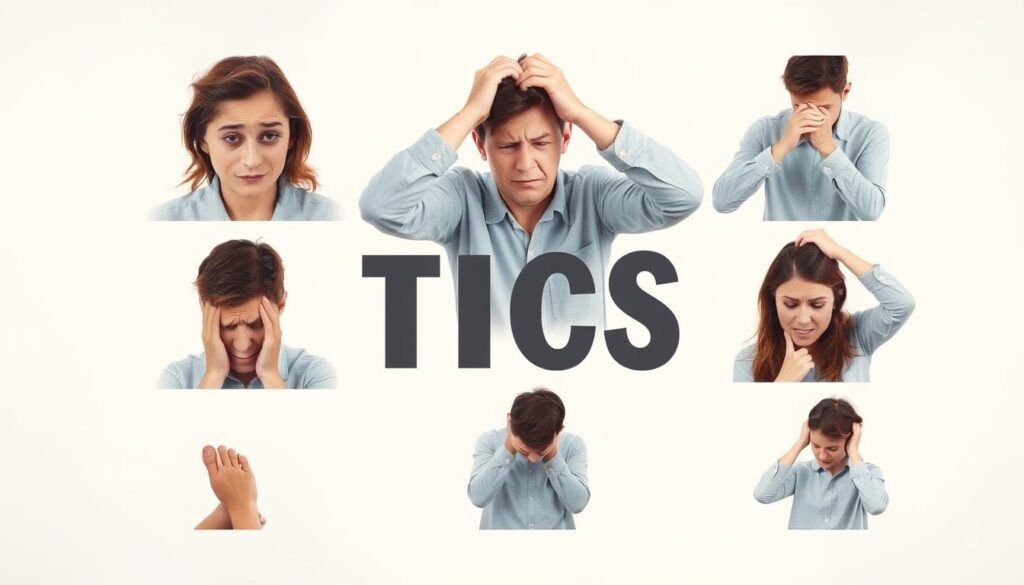Did you know nearly 34% of patients with tics have them start after stress? This fact links anxiety and involuntary movements, or anxiety tics. These symptoms can hugely affect daily life. Anxiety tics range from simple acts like blinking to complex noises like grunting. They come from high stress and worry levels.
Anxiety tics aren’t just tied to issues like Tourette Syndrome. They can also appear on their own. Knowing about these tics helps people deal with anxiety better. By spotting the signs and learning coping methods, quality of life can go up. This eases the stress of unexpected movements.
Key Takeaways
- Anxiety tics can manifest as both motor and vocal phenomena.
- Approximately 34% of patients experience tics after stressful events.
- These tics often subside on their own and are a typical response to anxiety.
- Understanding tic triggers is crucial for effective coping strategies.
- Approaches like Cognitive Behavioral Therapy can improve anxiety symptoms.
Understanding Anxiety Tics
Anxiety tics are sudden, involuntary actions caused by lots of stress and anxiety. These neurological symptoms change a lot from person to person. You might see someone blink a lot, jerk their head, or make sounds like clearing their throat. Both kids and adults can get these tics, especially during stressful times.
Emotional stress can make people blink or jerk their head more. Vocal tics may involve coughing or repeating words. These tics get worse when someone is stressed or anxious. This makes it hard for them to be comfortable in social places.
Unlike formal tic disorders, anxiety tics don’t have a specific diagnosis. Stress, being tired, or very excited can make tics stronger. This leads to feelings like embarrassment. These feelings make managing anxiety even tougher.
Research says anxiety tics usually begin at five years old. This is when kids start feeling anxious. By talking to a doctor, you can get help if tics happen a lot or mess with daily life. Using good anxiety management strategies helps a lot, too.
| Type of Tic | Examples | Triggers |
|---|---|---|
| Motor Tics | Blinking, head jerking, touching others | Stress, anxiety, excitement |
| Vocal Tics | Coughing, throat clearing, repeating phrases | Anxiety, pressure, fatigue |
The Link Between Anxiety and Tics
Anxiety can trigger tics, which are involuntary movements or sounds. In times of high anxiety, like panic attacks, tics may increase. This shows that stress-induced muscle tension can worsen tics. Having tics from anxiety doesn’t always mean there’s a tic disorder, though.
Statistics reveal that 1 in 5 children will have a tic disorder at some point. These disorders are most noticeable when kids are between 10 and 12 years old. While persistent tic disorders are rare, affecting less than 1 in 100 children, stress can make symptoms worse. A study found that 98.2% of participants said stress increased their tics.

Genetics play a big part in tic disorders. These disorders often come with ADHD and OCD. Managing anxiety and tics is crucial for good health. For more on how to handle anxiety and tics, check out this resource.
Anxiety Tics Symptoms: Recognizing and Coping with Them
Anxiety tics symptoms include involuntary movements and sounds. They often happen without warning, especially when stressed. Knowing about these signs is key for managing anxiety effectively.
Understanding these symptoms is crucial. It leads to better coping strategies. By recognizing triggers, such as stress, coping becomes easier. People find some methods particularly helpful.
Here are popular ways to manage tics:
- Distraction techniques, such as engaging in hobbies or social activities
- Relaxation exercises, including deep breathing and mindfulness meditation
- Positive affirmations to reinforce self-confidence
Using these strategies helps handle anxiety tics. It also boosts overall mental health. With the right methods, individuals can make great progress against anxiety disorders.
Common Types of Anxiety Tics
Anxiety tics symptoms vary from person to person. They show up mainly as motor or vocal types. Knowing about these helps in spotting and treating the symptoms well.
Motor tics are sudden, uncontrollable movements. They include things like:
- Eye blinking
- Head jerking
- Shoulder shrugging
- Facial grimacing
Vocal tics are unwanted sounds. Examples are:
- Throat clearing
- Snorting
- Grunting
- Repetitive phrases or noises
Tics fall into two main groups: simple and complex. Simple tics are quick and involve only one movement or sound. Complex tics have more than one action or several sounds together.
Knowing about anxiety tics symptoms matters a lot. It helps us talk about tics disorder better. Plus, it gives a clearer picture of possible treatments. For more info on anxiety tics, check this dedicated resource.

| Type of Tic | Description | Example Symptoms |
|---|---|---|
| Motor Tics | Involuntary movements of the body | Eye blinking, head jerking |
| Vocal Tics | Involuntary sounds made by the voice | Throat clearing, snorting |
| Simple Tics | A single movement or sound | Winking, brief cough |
| Complex Tics | A combination of movements or sounds | Repetitive phrases or sequences of movements |
Understanding these groups is useful. It helps in spotting neurological symptoms linked to different tic types. This is very important for deciding on treatment methods.
Identifying Tic Triggers
It’s important to know the tic triggers that lead to anxiety. These triggers can be different for everyone. Common ones include:
- Significant life changes, such as moving or changing schools
- Increased work-related stress or academic pressure
- Personal losses that cause emotional distress
- Overwhelming social situations that create anxiety
Lifestyle choices also play a big role. For instance, too much caffeine can make symptoms worse. Not getting enough sleep can also make tics more likely. Finding out your triggers is the first step towards handling them better. Knowing them helps in managing anxiety tics every day.

Becoming aware of triggers helps you figure out how to deal with your anxiety. This knowledge not only helps lessen symptoms. It also helps you feel more in control during tough times.
Managing Anxiety Tics: Coping Strategies
Managing anxiety tics can be tough since what works varies from person to person. Trying out different things is key to finding what eases your mind. Activities like playing instruments or singing can really help. They not only keep you busy but also let out energy tied to tics.
Exercise can make you feel better emotionally. For example, a good run can shake off tics and leave you feeling calm. It’s also helpful to talk with your family every day. These talks can ease your worries and give you the support you need.
Humor is another great tool. It can lift your spirits and reduce the stress from anxiety tics. Being part of a group or network can also help, especially if you feel alone. Learning about Tourette Syndrome (TS) gives both you and those around you strength. It makes talking about tics easier with friends, family, and coworkers.
Having a space just for you can help manage tics too. This quiet spot can lower anxiety and make you more comfortable. Getting help from doctors and teachers is important for better handling TS. And remember, staying away from stress triggers is key to dealing with anxiety tics well.
| Coping Strategy | Description |
|---|---|
| Physical Activity | Engaging in energetic exercises to release tension. |
| Creative Outlets | Playing instruments or singing to distract from tics. |
| Daily Support | Having one-on-one talks with family for emotional buffering. |
| Humor | Using laughter to improve mood and decrease distress. |
| Quiet Space | Setting aside a calm environment to manage anxiety levels. |
| Education | Learning about TS to empower oneself and others. |
| Support Networks | Joining groups for those feeling isolated by their condition. |
| Stress Management | Identifying and avoiding personal stress triggers. |
Treatment Options for Tics and Anxiety
Treating tics disorder needs a personalized approach. Many find relief through therapy and medication. Therapy is often the first choice and helps about 50-60% of people after several sessions. It teaches how to handle anxiety, which can reduce tic severity.
Habit Reversal Therapy is also effective, lessening tic frequency by 20-50%. If needed, neuroleptics help about 70% of patients. But, it’s important to watch out for side effects like weight gain and dry mouth.
Clonidine helps those with tics and ADHD in about 50% of cases. Botulinum toxin injections also offer relief to 40-60% of patients for up to three months.
In extreme cases, deep brain stimulation might be an option. However, its use is rare as studies on its effectiveness and safety continue. It’s vital to adjust treatment plans over time, especially when other conditions affect anxiety management.
When to Seek Professional Help
Knowing when to get help for anxiety tics is key to managing their effect on your life. At first, the symptoms of anxiety tics may not be too troubling. But if they get worse or don’t go away, you might need help. If tics start to mess with your friendships, school work, or happiness, talking to a mental health expert is a good idea.
Experts use a guide called the DSM-5-TR to figure out if someone’s symptoms match certain tic disorders. This could be Tourette syndrome, persistent motor or vocal tic disorder, or provisional tic disorder. Figuring out the exact problem early can help a lot. This is especially true if anxiety makes the tics worse.
Here are some signs that you should probably see a professional:
- Tics that get worse or don’t go away over time.
- Other signs of anxiety, like a lot of worrying or panic attacks.
- Having a hard time paying attention or learning, which happens in kids with Tourette syndrome.
- If you’re worried about your child pulling away from friends or acting differently.
Getting the right diagnosis and treatment early is crucial. Treatment that fits the person can really help control tics. It can also help with any other mental health issues. Groups like the Tourette Association offer support and advice to families dealing with these issues.
| Type of Tic Disorder | Criteria |
|---|---|
| Tourette Syndrome | Motor and vocal tics for at least 1 year; symptoms start before age 18. |
| Persistent Tic Disorder | Motor or vocal tics almost daily for more than 1 year; symptoms start before age 18. |
| Provisional Tic Disorder | Tics present for less than 12 months; symptoms start before age 18. |
Conclusion
It’s key to know about anxiety tics symptoms for better management. These involuntary actions can greatly affect daily activities. By spotting stress triggers, people can find ways to lessen anxiety’s impact on tics.
While tics from anxiety can be tough, getting better is often possible with the right help.
About 30%-50% of young people with Chronic Tic Disorder also have an anxiety disorder. Understanding this link helps grasp how anxiety worsens tics. Making life changes, using self-help tips, and therapy like cognitive-behavioral therapy can help a lot. For more tips on handling anxiety, check out this resource.
The link between anxiety and tics can be hard, but managing it proactively helps. Knowing the main symptoms and trying new treatments can help people deal with anxiety better. This improves life quality significantly.